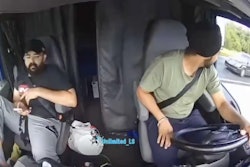- The Department of Homeland Security and Department of Transportation are putting states "on notice" that stricter immigration enforcement is coming to trucking.
- DOT Secretary Sean Duffy specifically called out Washington state for issuing a full-term, normal CDL to an asylum seeker, saying that violated federal rules.
- Duffy also said New Mexico "blatantly" ignored federal English language proficiency guidance and didn't place OOS a driver who went on to cause a triple-fatal crash in Florida last week.
- States could lose federal funding for non-compliance, but the feds have been quiet about specifics and next steps.
The gloves have come off in a fight between the federal government and states over CDL issuance to "illegal alien" drivers and enforcement of English language proficiency in roadside inspections after the deadly crash on the Florida turnpike reported on Monday.
The DOT has, since President Donald Trump's executive order in April, been conducting a "review" of CDL issuance practices both for non-domiciled CDLs, which can be issued to non-citizens in the country with temporary work authorization, and CDLs generally.
On Wednesday, DHS threw its hat in the ring as well.
"DHS will work with" the DOT "to root out and prevent illegal aliens from obtaining these licenses from sanctuary jurisdictions that put American drivers and passengers in danger," the DHS said via social media.
DHS's statement was responding to a Fox News segment about Harjinder Singh, the "illegal alien" (according to DHS) whose U-turn on the Florida Turnpike took three lives on August 12. Singh, now in custody in California, has signed extradition paperwork to return to Florida and face state charges for three counts of vehicular homicide.
DOT itself stepped up the rhetoric on Wednesday, too, with Secretary Sean Duffy writing on social media "to states that don’t follow the rules -- you are on notice!"

For now, federal and state authorities have been quiet on what exactly the DOT investigation or DHS collaboration might entail exactly, but statements from Florida, California, and Washington state officials offer some clues.
Florida, feds "go after" California
Florida Attorney General James Uthmeier on Fox News Monday said the state would charge Singh "with the heaviest crimes we can and make sure he gets locked up for as long as possible before then getting deported back where he's from." Yet the three counts of vehicular homicide could see Singh spend the rest of his life in a Florida jail.
Uthmeier further said Florida was looking for ways to "go after" California for issuing Singh a CDL, despite Singh having had a judge rule he entered the country illegally back in 2019. Later, Singh prolonged his stay in the U.S. by claiming asylum.
The feds, too, seemed to have an appetite for prosecution. A press release from DHS on Monday pointed to the shocking nature of the video evidence against Singh.
The DHS release said video "obtained from Breaking911 from inside the tractor trailer shows the exact moment Singh decided to break U.S. highway laws as he turned his truck into traffic," DHS wrote. "[H]is face shows no shock or remorse for his actions or the lives he destroyed."
Assistant Secretary Tricia McLaughlin then pointed the finger at California in the wake of the crash. “Three innocent people were killed in Florida because Gavin Newsom’s California Department of Motor Vehicles issued an illegal alien a Commercial Driver’s License," she said, adding "this state of governance is asinine. How many more innocent people must die before Gavin Newsom stops playing games with the safety of the American public?"
State licensing officials respond
A press release from DOT on Tuesday joined in DHS' frustration and made clear that California wasn't the only state that issued a CDL to Singh during his time in the U.S. In July 2023, Washington state issued Singh a full-term CDL, according to DOT, who also said "asylum seekers or individuals without legal status are NOT eligible for this type of license."
Asked about this statement, Washington's Department of Licensing told Overdrive it is "investigating the 2023 issuance of Mr. Singh’s prior commercial driver license." Washington does issue "limited term" CDLs to non-citizens in the country with temporary work authorization, and has done so at an increasing rate in recent years, as reporting uncovered in April.
In 2024, then, California issued Singh a "limited term CDL," DOT noted, which is typically tied to the applicant's legal length of stay in the U.S.
DOT in its press release added that its Federal Motor Carrier Safety Administration "is investigating the issuance" of the California license "to determine whether it was issued in accordance with Federal regulations."
Washington state typically issues CDLs for a six- or eight-year term, and without any indication that Singh had a "limited term" CDL, it's unclear what if anything could have prevented him from renewing that license at the end of its term, or necessitated the California license the following year.
Singh got both CDLs while apparently lacking English language proficiency. The DOT release said officials administered the English assessment following the crash, and he failed.
DOT pointed to a July 3, 2025, inspection of Singh by New Mexico State Police that did not include an English language proficiency assessment. Under new federal guidance, drivers who fail such assessments under the FMCSA's new guidance should be put out-of-service.
“In some of these states you have liberal governors who don’t want to comply with the law, and they think that they know best and that we’re just trying to be mean to illegals," Duffy said in an interview with the Real Voice of America outlet on Wednesday. “They just blatantly in New Mexico said we’re not going to comply with federal regulation and give him that road test."
States that don't comply with federal regulations risk losing millions in federal grants for training inspectors and road maintenance, but the Commercial Vehicle Safety Alliance has indicated to Overdrive that this funding leaves a lot of leeway for states to differ.
California, in a statement given to Overdrive, insisted that it followed federal regulations in issuing Singh the limited-term CDL.
The Owner-Operator Independent Drivers Association on Tuesday called on Duffy to end the issuance of non-domiciled CDLs until states can institute stricter background checks on foreign applicants.
California specifically has told Overdrive it will issue CDLs to drivers who don't give a first name, and that it does not enforce the English language proficiency guidance issued by FMCSA in June.
An Overdrive review published last month that analyzed CDL issuance in all 50 states found that, often, a CDL applicant only needs an I-94 form -- easily obtained through the CBP One app during the Biden administration -- and a few other documents to prove residence. Depending on the jurisdiction, documents might include old cell phone bills or any letter from a non-profit, homeless shelter, or school.
Download the full report on all 50 states' non-domiciled CDL issuance practices below.











